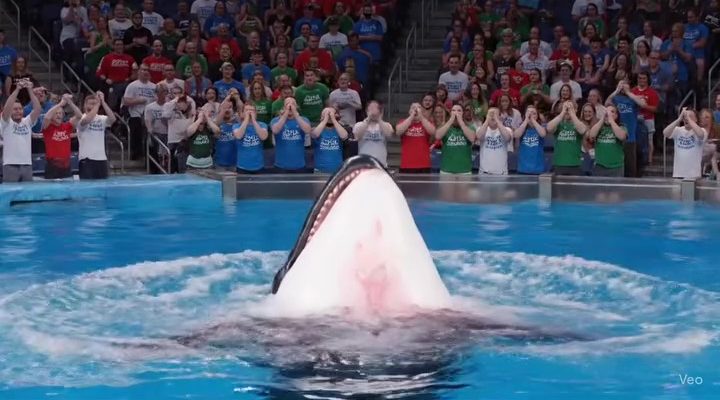
In a terrifying and extremely rare event at an aquarium, a marine mammal trainer had a close call after being pulled into the mouth of a beluga whale during a routine session.
What Happened?
The incident occurred during a supervised interaction between a trainer and a beluga whale in a large water tank. Beluga whales are known for their intelligence, gentle nature, and curious personalities, often interacting closely with their caregivers.
Reports indicate that the whale, likely acting out of playful curiosity rather than aggression, took the trainer’s head or arm into its mouth. Using a gentle suction motion—a natural behavior they use to feed on fish in the wild—the whale pulled the trainer partially into the water.
Was the Trainer in Serious Danger?
While the situation was undoubtedly frightening, beluga whales are not predators that view humans as food. They do not have large, sharp teeth designed for tearing apart prey like killer whales or sharks. Instead, their teeth are designed for gripping fish.
The greatest dangers in this incident were:
-
Drowning: The risk of being held underwater.
-
Injury from Pressure: The sheer power of the whale’s jaw muscles could cause crushing injuries or broken bones.
-
Panic: The natural fear response could have made the situation more dangerous.
Thankfully, the whale released the trainer almost immediately. The trainer was able to get out of the water and received immediate medical attention for their injuries, which are believed to be non-life-threatening.
Why Would a Beluga Whale Do This?
Animal experts emphasize that this behavior is not typical of a beluga whale acting aggressively. The most common explanations are:
-
Playful Curiosity: Belugas are very interactive and often use their mouths to explore their environment, similar to how a puppy might mouth a person’s hand.
-
Misguided Play: The whale may have been attempting to initiate play or interaction in a way that is normal for them but is dangerously powerful for a human.
-
Seeking a Reaction: These are intelligent animals that sometimes test boundaries or seek a specific response from their trainers.
The Aftermath
Following the incident, the aquarium involved will certainly conduct a thorough review of its safety protocols. The whale will likely be given a “time-out” from training sessions to allow trainers to assess its behavior and ensure it was an isolated event. The well-being of both the animals and the trainers is always the top priority at professional aquariums.
This rare event serves as a powerful reminder of the inherent risks of working with large, powerful wild animals, no matter how well-trained or gentle they typically seem.



